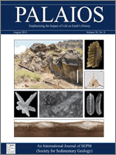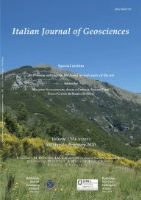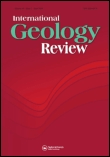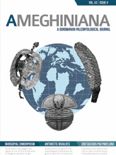
STRATIGRAPHY AND GEOLOGICAL CORRELATION
Scope & Guideline
Charting the Course of Geological Discovery
Introduction
Aims and Scopes
- Stratigraphic Analysis:
The journal emphasizes detailed stratigraphic studies, exploring sedimentary sequences, lithology, and depositional environments to understand geological history. - Geochronology and Isotope Studies:
It includes research utilizing various geochronological techniques, particularly U-Th-Pb and Nd-Hf isotopic studies, to date geological formations and investigate their origins. - Paleobiology and Paleoecology:
The journal encourages studies on paleobiocommunities, ichnology, and fossil records, providing insights into ancient ecosystems and their evolutionary significance. - Geological Mapping and Correlation:
Research that focuses on geological mapping and correlating stratigraphic sections across different regions is a core component, contributing to a comprehensive understanding of geological formations. - Regional Geology and Tectonics:
The journal addresses regional geological features and tectonic processes, contributing to the understanding of geological evolution and the effects of tectonic events on sedimentation. - Paleoclimatology and Environmental Change:
There is a consistent focus on the interplay between geological formations and past climatic conditions, exploring how environmental changes affect sedimentation and fossil preservation.
Trending and Emerging
- Integration of Geochemical Techniques:
There is a notable increase in studies employing multi-isotope geochemical techniques to analyze rock formations, enhancing understanding of their origins and age. - Biostratigraphy and Microfossil Studies:
An emerging focus on biostratigraphy, particularly through the examination of microfossils and palynomorphs, is evident, contributing to refined stratigraphic frameworks. - Paleobiocommunity Dynamics:
Research exploring the evolution and dynamics of paleobiocommunities, particularly during key geological transitions, is gaining traction, reflecting an interest in ecological responses to environmental changes. - Climate Change and Geological Impact:
There is a growing emphasis on studying the impacts of historical climate change on geological processes and sedimentation patterns, linking stratigraphy with paleoclimatology. - Regional Stratigraphic Correlation:
An increasing trend towards regional correlations of stratigraphic sections highlights the importance of understanding geological relationships across different geographical areas, fostering collaboration among researchers.
Declining or Waning
- Volcanology and Igneous Petrology:
Research articles focusing on volcanic activity and igneous rock formation have decreased, indicating a potential waning interest in these areas compared to the growing emphasis on sedimentology and stratigraphy. - Mineralogy and Geochemistry:
The exploration of mineralogical characteristics and geochemical analyses appears to have diminished, suggesting a shift towards broader geological frameworks rather than intricate mineral studies. - Paleoenvironmental Reconstructions:
While still relevant, there seems to be less emphasis on detailed paleoenvironmental reconstructions, which may have been overshadowed by more integrative studies that combine multiple geological disciplines. - Geological Hazards and Risk Assessment:
Research related to geological hazards, such as landslides and earthquakes, has become less prominent, perhaps reflecting a broader focus on stratigraphy and historical geology. - Paleomagnetic Studies:
The number of articles focusing on paleomagnetism has declined, possibly due to the rise of more advanced geochronological techniques that provide clearer geological timelines.
Similar Journals

GEOLOGICAL QUARTERLY
Exploring Earth's Mysteries, One Quarter at a Time.GEOLOGICAL QUARTERLY, published by the Polish Geological Institute, is a respected journal in the field of geology, offering insights into Earth and planetary sciences since its inception in 2000. With an ISSN of 1641-7291 and an E-ISSN of 2082-5099, this journal serves as a vital platform for researchers, professionals, and students seeking to expand their knowledge in geological disciplines. The journal is positioned in Q3 within the geology category as of 2023 and ranks #172 out of 321 in Scopus, placing it in the 46th percentile among its peers. Although currently not an open-access publication, GEOLOGICAL QUARTERLY reflects the policy of fostering scientific communication and collaboration by disseminating valuable geological research. Its commitment to publishing original articles, reviews, and technical notes ensures that it plays a significant role in advancing geological science and its applications within the academic community. With its base in Warsaw, Poland, the journal stands as an important resource for anyone engaged in or studying the Earth sciences.

Austrian Journal of Earth Sciences
Fostering Global Collaboration in Earth SciencesThe Austrian Journal of Earth Sciences, published by SCIENDO, is an esteemed open-access journal specializing in the disciplines of geology, paleontology, and stratigraphy. With an ISSN of 2072-7151, this journal has established itself as a significant platform for innovative research and scholarly communication in the earth sciences. Since its inception in 2007, it has continuously expanded its influence, achieving notable rankings in the Scopus database—#113 in Geology, #42 in Paleontology, and #21 in Stratigraphy, demonstrating its commitment to high-quality publications. The journal holds prestigious quartile rankings of Q1 in both Geology and Paleontology and Q2 in Stratigraphy as of 2023, reflecting its impact and relevance in the scientific community. Researchers and students alike are encouraged to explore and contribute to the evolving discourse within this dynamic field, as the Austrian Journal of Earth Sciences fosters collaboration and knowledge sharing across global platforms.

ANNALES SOCIETATIS GEOLOGORUM POLONIAE
Exploring the Frontiers of Geology and Stratigraphy.ANNALES SOCIETATIS GEOLOGORUM POLONIAE is a distinguished journal published by the Polish Geological Society, focusing on pivotal research in the fields of geology, economic geology, and stratigraphy. With an ISSN of 0208-9068, this journal has established itself as an essential platform for disseminating significant findings and advancements in geological sciences since its convergence in 2008. The journal proudly holds a Q2 quartile ranking in the categories of Economic Geology, Geology, and Stratigraphy as of 2023, indicating its respectable position within the global academic community. Researchers will find its indexed status in Scopus, ranking #138/321 in Geology and showcasing a solid presence in key geological sub-disciplines. While the journal is not open access, it remains a vital resource for professionals and students striving for insight into contemporary geological research. Located in Krakow, Poland, the journal continues to contribute significantly to the understanding of geological processes and resources, making it an indispensable reference for anyone in the field.

PALAIOS
Connecting the Dots Between Past and PresentPALAIOS is a renowned journal published by the SEPM-Society for Sedimentary Geology, focusing on the interdisciplinary fields of paleontology and sedimentary geology. Established in 1986, this scholarly publication serves as a vital platform for disseminating innovative research and insightful reviews that bridge ecological and evolutionary aspects with paleontological studies. With an impressive track record, the journal has achieved a commendable impact factor and consistently holds a Q2 ranking in both Ecology, Evolution, Behavior and Systematics and Paleontology as of 2023. Researchers and professionals will benefit from the diverse range of studies presented, which encompass fossil analysis, stratigraphy, and the impacts of climate change on past ecosystems. By being at the forefront of research and education in these fields, PALAIOS not only enhances comprehension of historical biodiversity patterns but also informs contemporary ecological theories.

Italian Journal of Geosciences
Empowering Inquiry: Your Source for Geoscientific ExcellenceItalian Journal of Geosciences, published by the Società Geologica Italiana, is a distinguished platform for the dissemination of research in the fields of Earth and Planetary Sciences and Geology. With an impressive impact factor reflected in its 2023 rankings, where it placed in the Q3 category across its related fields, this journal serves as a vital resource for academics, practitioners, and students. Established in 2010 and poised to continue until 2024, the journal showcases critical advancements and interdisciplinary studies that deepen our understanding of geological processes and Earth systems. Operating under open access options, it offers robust accessibility to a broad audience, facilitating wider dissemination of knowledge. The journal's affiliation with Università degli Studi La Sapienza in Rome, Italy, further underscores its commitment to academic excellence and innovation in geosciences.

INTERNATIONAL GEOLOGY REVIEW
Advancing geological knowledge for a sustainable future.INTERNATIONAL GEOLOGY REVIEW, published by Taylor & Francis Inc, is a premier journal dedicated to advancing the field of geology since its inception in 1959. With its Q1 ranking in the field of Geology for 2023, this journal is a significant platform for researchers, professionals, and students exploring the intricacies of Earth and planetary sciences. The journal has been rated in the 81st percentile within Scopus rankings, reflecting its influence and the high quality of articles published. Although it does not offer Open Access options, the journal maintains a rigorous peer-review process to ensure the publication of original and impactful research. With an extensive archive projected to continue until 2024, INTERNATIONAL GEOLOGY REVIEW serves as an essential resource for those seeking to deepen their understanding of geological phenomena, making it a vital contributor to the global scientific community.

Andean Geology
Connecting Scholars Through Open Access GeoscienceAndean Geology is a prominent open-access journal, published by the SERVICIO NACIONAL GEOLOGIA MINERVA in Chile, dedicated to advancing the fields of geology, geochemistry, petrology, paleontology, and stratigraphy. Since its inception in 2009, the journal has provided a vital platform for the dissemination of research pertaining to the Andean region and beyond, featuring high-quality articles that contribute to our understanding of earth sciences. With an impressive ranking in the Q2 and Q3 quartiles across multiple categories, it reflects a growing impact in the geological community, evidenced by its status within Scopus rankings. Andean Geology not only supports the academic pursuit of knowledge with its open-access policy but also aims to foster collaboration among researchers and professionals worldwide, ensuring wide accessibility of groundbreaking research and promoting academic engagement. By covering a diverse array of topics relevant to the dynamic field of geology, this journal serves as an essential resource for students, professionals, and scholars dedicated to earth and planetary sciences.

JOURNAL OF IBERIAN GEOLOGY
Illuminating the geological landscape of the Iberian Peninsula.JOURNAL OF IBERIAN GEOLOGY, published by Springer International Publishing AG, is a pivotal platform dedicated to advancing the field of geology and stratigraphy. With an ISSN of 1698-6180 and E-ISSN of 1886-7995, this journal has earned its reputation in the academic community, holding a commendable Q2 ranking in both Geology and Stratigraphy for 2023, reflecting its contributions to contemporary geological research. Spanning from 2007 to 2024, it provides a comprehensive forum for scholars and practitioners from around the globe to disseminate their findings pertaining to the Iberian Peninsula, enhancing the understanding of regional geological phenomena. The journal has carved out a significant niche within the Earth and Planetary Sciences, ranking #137 out of 321 in Geology and #24 out of 55 in Stratigraphy, indicating its wide-reaching impact and scholarly engagement. The Journal of Iberian Geology serves as an indispensable resource for those interested in the complexities of geological structures, stratigraphic sequences, and the broader implications of geological research, making it a vital reference for researchers, professionals, and students alike.

BULLETIN OF THE GEOLOGICAL SOCIETY OF DENMARK
Unveiling the Layers of Earth's SecretsBULLETIN OF THE GEOLOGICAL SOCIETY OF DENMARK, published by the Geological Society of Denmark, serves as a key platform for the dissemination of original research and comprehensive reviews related to geological studies in Denmark and beyond. With an ISSN of 2245-7070, this journal provides a significant avenue for sharing findings that contribute to our understanding of geological processes, resources, and the history of the Earth. Although it operates under traditional access options, the journal encourages a rich scholarly dialogue among researchers, professionals, and students alike. Its impact is evident in the broad scope it covers, catering to diverse areas of geology, including but not limited to sedimentology, paleontology, and environmental geology. By fostering an environment of knowledge sharing, the BULLETIN OF THE GEOLOGICAL SOCIETY OF DENMARK is not just a journal; it is a vital resource for anyone invested in advancing geological science.

AMEGHINIANA
Pioneering Discoveries in Paleontology and BehaviorAMEGHINIANA is a distinguished academic journal published by the ASOCIACION PALEONTOLOGICA ARGENTINA, serving as a vital platform for the dissemination of cutting-edge research in the fields of Ecology, Evolution, Behavior and Systematics, as well as Paleontology. With its ISSN 0002-7014 and E-ISSN 1851-8044, the journal has established itself as a key reference point for scholars seeking to explore the intricate relationships within ecological systems and the evolutionary history of species. Despite not offering open access, AMEGHINIANA maintains a reputation bolstered by a Q3 ranking in both its subject categories, underlining its sustained commitment to enhancing scientific knowledge. Researchers and professionals alike benefit from this journal’s extensive archive of studies dating back to 1985, with ongoing contributions expected until 2024. With a focus on high-quality content, this journal is essential for anyone immersed in the study of paleobiology and ecological systems.